Professional Practice 1: CPD, Responsibilities, and Future Goals
VerifiedAdded on 2024/05/31
|8
|1552
|193
Report
AI Summary
This report examines the significance of Continuing Professional Development (CPD) and its contribution to personal and professional growth. It discusses the importance of CPD in fostering a learning culture within the workplace and its role in enhancing skills and knowledge across various sectors, including education. The report highlights how CPD supports individuals in maintaining ethical standards, improving decision-making, and fostering effective team management. Furthermore, the report includes a detailed development plan outlining responsibilities, performance objectives, and required skills for future career goals, emphasizing the importance of analytical skills, critical thinking, risk management, and effective communication. This plan serves as a roadmap for individuals seeking to enhance their professional capabilities and achieve their career aspirations. Desklib offers a wealth of similar resources for students seeking academic support.
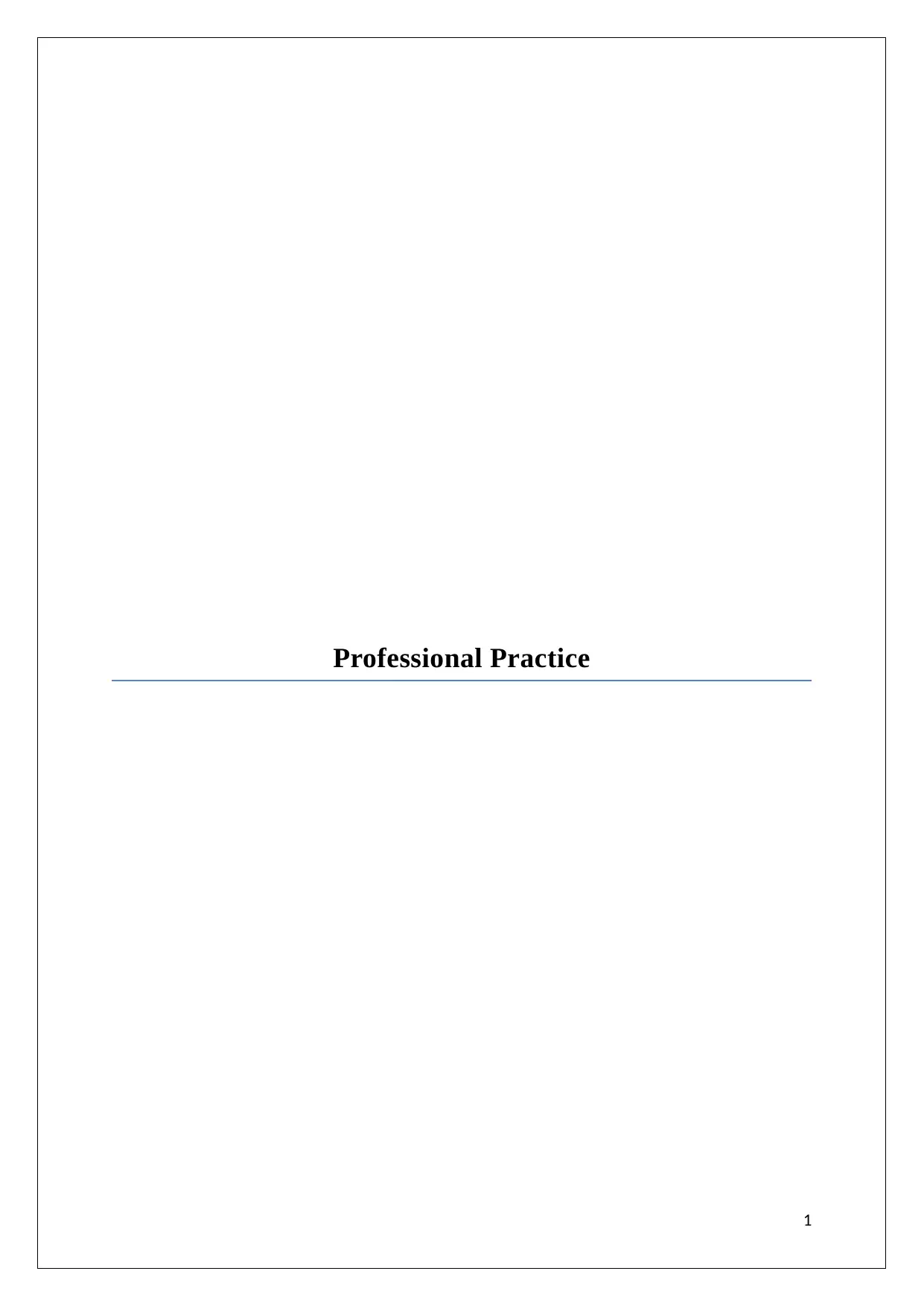
Professional Practice
1
1
Paraphrase This Document
Need a fresh take? Get an instant paraphrase of this document with our AI Paraphraser
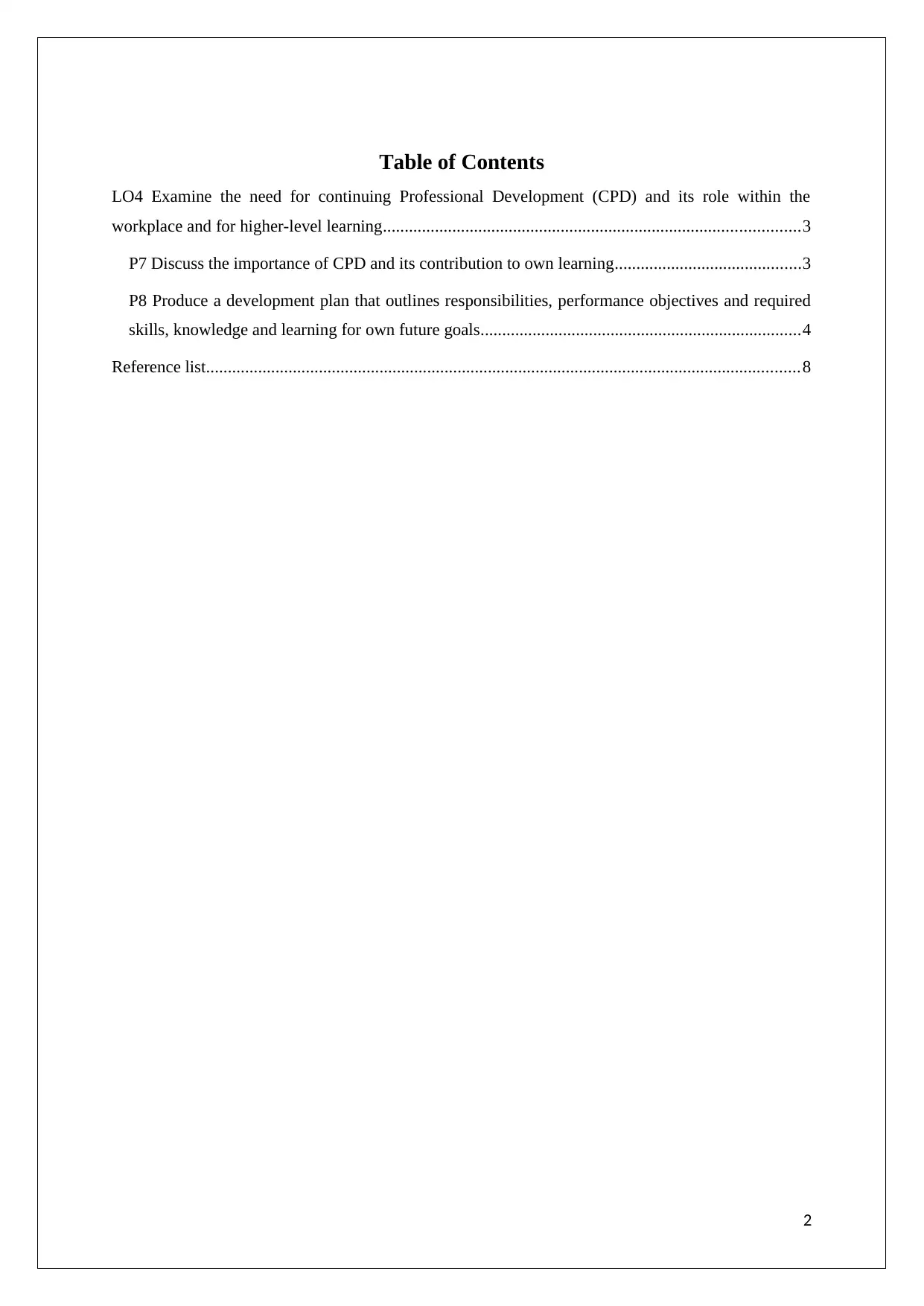
Table of Contents
LO4 Examine the need for continuing Professional Development (CPD) and its role within the
workplace and for higher-level learning................................................................................................3
P7 Discuss the importance of CPD and its contribution to own learning...........................................3
P8 Produce a development plan that outlines responsibilities, performance objectives and required
skills, knowledge and learning for own future goals..........................................................................4
Reference list.........................................................................................................................................8
2
LO4 Examine the need for continuing Professional Development (CPD) and its role within the
workplace and for higher-level learning................................................................................................3
P7 Discuss the importance of CPD and its contribution to own learning...........................................3
P8 Produce a development plan that outlines responsibilities, performance objectives and required
skills, knowledge and learning for own future goals..........................................................................4
Reference list.........................................................................................................................................8
2
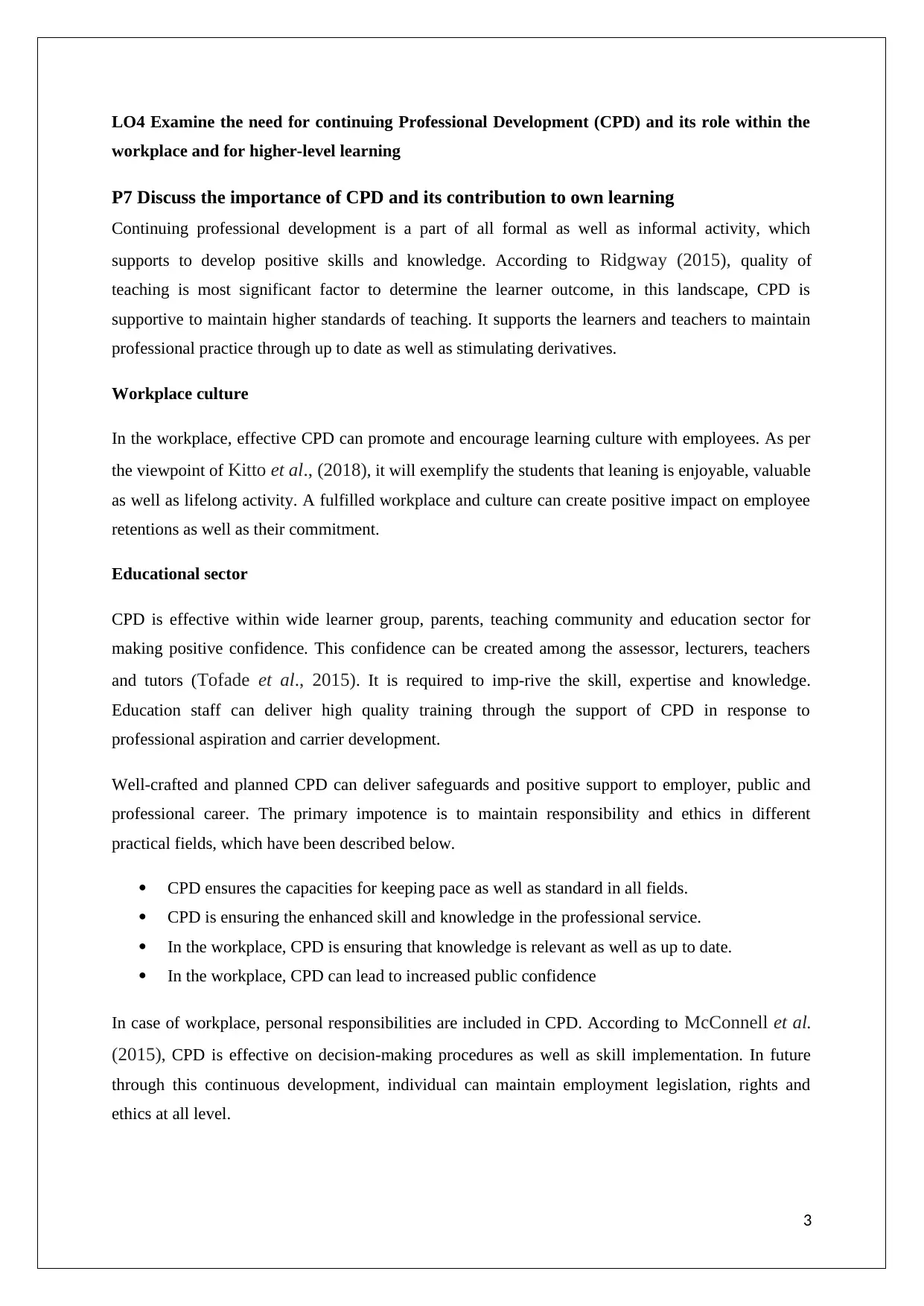
LO4 Examine the need for continuing Professional Development (CPD) and its role within the
workplace and for higher-level learning
P7 Discuss the importance of CPD and its contribution to own learning
Continuing professional development is a part of all formal as well as informal activity, which
supports to develop positive skills and knowledge. According to Ridgway (2015), quality of
teaching is most significant factor to determine the learner outcome, in this landscape, CPD is
supportive to maintain higher standards of teaching. It supports the learners and teachers to maintain
professional practice through up to date as well as stimulating derivatives.
Workplace culture
In the workplace, effective CPD can promote and encourage learning culture with employees. As per
the viewpoint of Kitto et al., (2018), it will exemplify the students that leaning is enjoyable, valuable
as well as lifelong activity. A fulfilled workplace and culture can create positive impact on employee
retentions as well as their commitment.
Educational sector
CPD is effective within wide learner group, parents, teaching community and education sector for
making positive confidence. This confidence can be created among the assessor, lecturers, teachers
and tutors (Tofade et al., 2015). It is required to imp-rive the skill, expertise and knowledge.
Education staff can deliver high quality training through the support of CPD in response to
professional aspiration and carrier development.
Well-crafted and planned CPD can deliver safeguards and positive support to employer, public and
professional career. The primary impotence is to maintain responsibility and ethics in different
practical fields, which have been described below.
CPD ensures the capacities for keeping pace as well as standard in all fields.
CPD is ensuring the enhanced skill and knowledge in the professional service.
In the workplace, CPD is ensuring that knowledge is relevant as well as up to date.
In the workplace, CPD can lead to increased public confidence
In case of workplace, personal responsibilities are included in CPD. According to McConnell et al.
(2015), CPD is effective on decision-making procedures as well as skill implementation. In future
through this continuous development, individual can maintain employment legislation, rights and
ethics at all level.
3
workplace and for higher-level learning
P7 Discuss the importance of CPD and its contribution to own learning
Continuing professional development is a part of all formal as well as informal activity, which
supports to develop positive skills and knowledge. According to Ridgway (2015), quality of
teaching is most significant factor to determine the learner outcome, in this landscape, CPD is
supportive to maintain higher standards of teaching. It supports the learners and teachers to maintain
professional practice through up to date as well as stimulating derivatives.
Workplace culture
In the workplace, effective CPD can promote and encourage learning culture with employees. As per
the viewpoint of Kitto et al., (2018), it will exemplify the students that leaning is enjoyable, valuable
as well as lifelong activity. A fulfilled workplace and culture can create positive impact on employee
retentions as well as their commitment.
Educational sector
CPD is effective within wide learner group, parents, teaching community and education sector for
making positive confidence. This confidence can be created among the assessor, lecturers, teachers
and tutors (Tofade et al., 2015). It is required to imp-rive the skill, expertise and knowledge.
Education staff can deliver high quality training through the support of CPD in response to
professional aspiration and carrier development.
Well-crafted and planned CPD can deliver safeguards and positive support to employer, public and
professional career. The primary impotence is to maintain responsibility and ethics in different
practical fields, which have been described below.
CPD ensures the capacities for keeping pace as well as standard in all fields.
CPD is ensuring the enhanced skill and knowledge in the professional service.
In the workplace, CPD is ensuring that knowledge is relevant as well as up to date.
In the workplace, CPD can lead to increased public confidence
In case of workplace, personal responsibilities are included in CPD. According to McConnell et al.
(2015), CPD is effective on decision-making procedures as well as skill implementation. In future
through this continuous development, individual can maintain employment legislation, rights and
ethics at all level.
3
⊘ This is a preview!⊘
Do you want full access?
Subscribe today to unlock all pages.

Trusted by 1+ million students worldwide
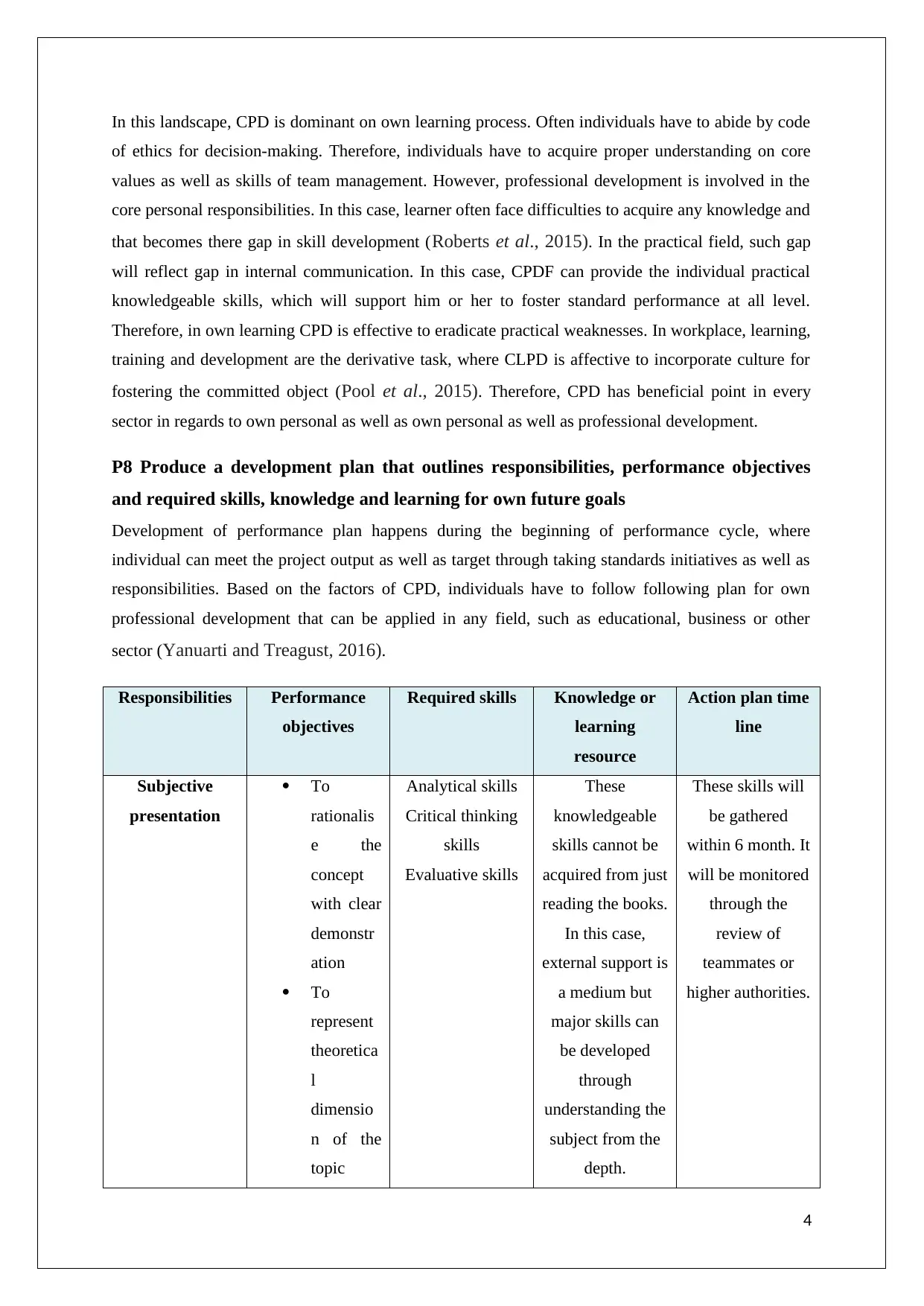
In this landscape, CPD is dominant on own learning process. Often individuals have to abide by code
of ethics for decision-making. Therefore, individuals have to acquire proper understanding on core
values as well as skills of team management. However, professional development is involved in the
core personal responsibilities. In this case, learner often face difficulties to acquire any knowledge and
that becomes there gap in skill development (Roberts et al., 2015). In the practical field, such gap
will reflect gap in internal communication. In this case, CPDF can provide the individual practical
knowledgeable skills, which will support him or her to foster standard performance at all level.
Therefore, in own learning CPD is effective to eradicate practical weaknesses. In workplace, learning,
training and development are the derivative task, where CLPD is affective to incorporate culture for
fostering the committed object (Pool et al., 2015). Therefore, CPD has beneficial point in every
sector in regards to own personal as well as own personal as well as professional development.
P8 Produce a development plan that outlines responsibilities, performance objectives
and required skills, knowledge and learning for own future goals
Development of performance plan happens during the beginning of performance cycle, where
individual can meet the project output as well as target through taking standards initiatives as well as
responsibilities. Based on the factors of CPD, individuals have to follow following plan for own
professional development that can be applied in any field, such as educational, business or other
sector (Yanuarti and Treagust, 2016).
Responsibilities Performance
objectives
Required skills Knowledge or
learning
resource
Action plan time
line
Subjective
presentation
To
rationalis
e the
concept
with clear
demonstr
ation
To
represent
theoretica
l
dimensio
n of the
topic
Analytical skills
Critical thinking
skills
Evaluative skills
These
knowledgeable
skills cannot be
acquired from just
reading the books.
In this case,
external support is
a medium but
major skills can
be developed
through
understanding the
subject from the
depth.
These skills will
be gathered
within 6 month. It
will be monitored
through the
review of
teammates or
higher authorities.
4
of ethics for decision-making. Therefore, individuals have to acquire proper understanding on core
values as well as skills of team management. However, professional development is involved in the
core personal responsibilities. In this case, learner often face difficulties to acquire any knowledge and
that becomes there gap in skill development (Roberts et al., 2015). In the practical field, such gap
will reflect gap in internal communication. In this case, CPDF can provide the individual practical
knowledgeable skills, which will support him or her to foster standard performance at all level.
Therefore, in own learning CPD is effective to eradicate practical weaknesses. In workplace, learning,
training and development are the derivative task, where CLPD is affective to incorporate culture for
fostering the committed object (Pool et al., 2015). Therefore, CPD has beneficial point in every
sector in regards to own personal as well as own personal as well as professional development.
P8 Produce a development plan that outlines responsibilities, performance objectives
and required skills, knowledge and learning for own future goals
Development of performance plan happens during the beginning of performance cycle, where
individual can meet the project output as well as target through taking standards initiatives as well as
responsibilities. Based on the factors of CPD, individuals have to follow following plan for own
professional development that can be applied in any field, such as educational, business or other
sector (Yanuarti and Treagust, 2016).
Responsibilities Performance
objectives
Required skills Knowledge or
learning
resource
Action plan time
line
Subjective
presentation
To
rationalis
e the
concept
with clear
demonstr
ation
To
represent
theoretica
l
dimensio
n of the
topic
Analytical skills
Critical thinking
skills
Evaluative skills
These
knowledgeable
skills cannot be
acquired from just
reading the books.
In this case,
external support is
a medium but
major skills can
be developed
through
understanding the
subject from the
depth.
These skills will
be gathered
within 6 month. It
will be monitored
through the
review of
teammates or
higher authorities.
4
Paraphrase This Document
Need a fresh take? Get an instant paraphrase of this document with our AI Paraphraser
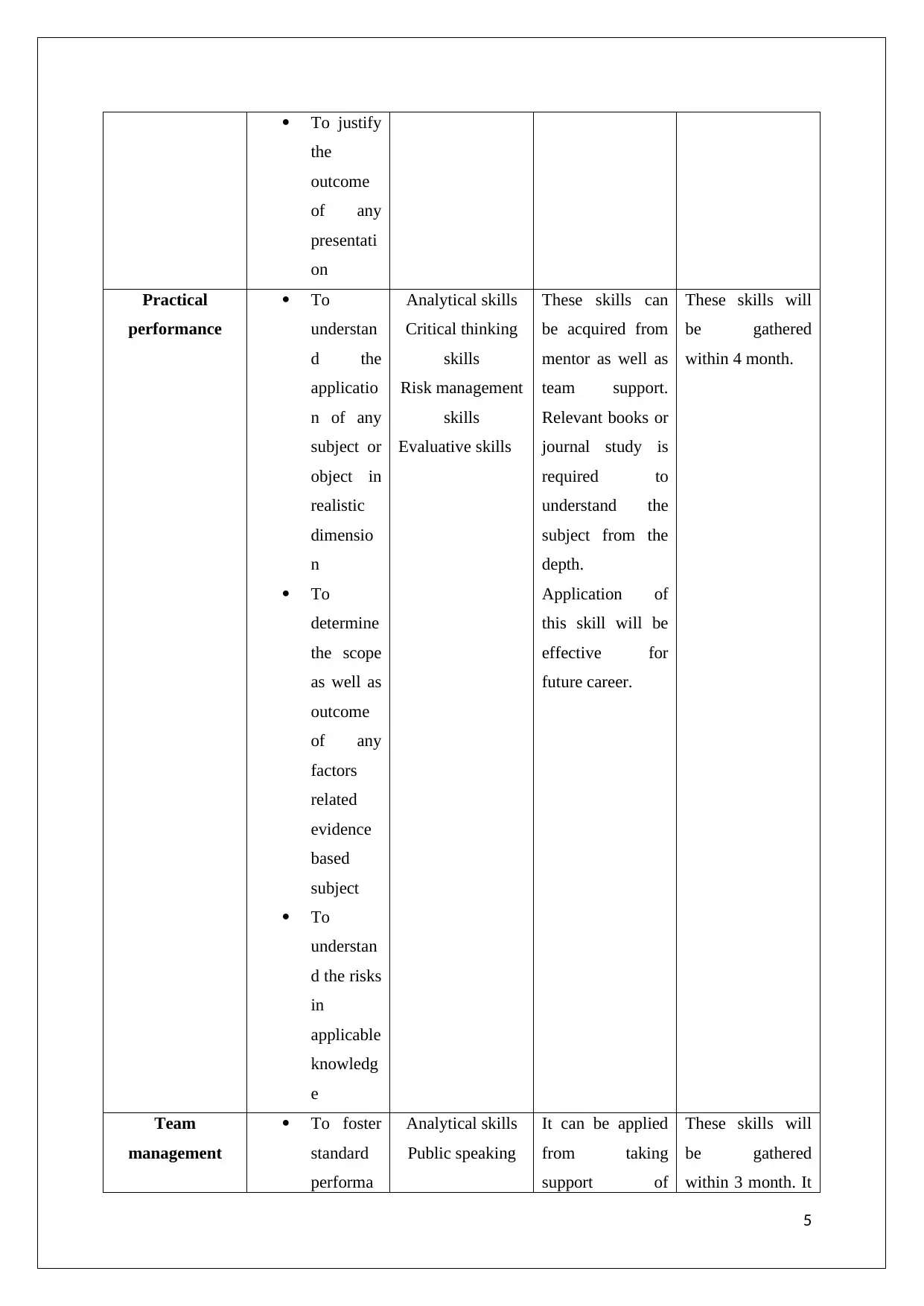
To justify
the
outcome
of any
presentati
on
Practical
performance
To
understan
d the
applicatio
n of any
subject or
object in
realistic
dimensio
n
To
determine
the scope
as well as
outcome
of any
factors
related
evidence
based
subject
To
understan
d the risks
in
applicable
knowledg
e
Analytical skills
Critical thinking
skills
Risk management
skills
Evaluative skills
These skills can
be acquired from
mentor as well as
team support.
Relevant books or
journal study is
required to
understand the
subject from the
depth.
Application of
this skill will be
effective for
future career.
These skills will
be gathered
within 4 month.
Team
management
To foster
standard
performa
Analytical skills
Public speaking
It can be applied
from taking
support of
These skills will
be gathered
within 3 month. It
5
the
outcome
of any
presentati
on
Practical
performance
To
understan
d the
applicatio
n of any
subject or
object in
realistic
dimensio
n
To
determine
the scope
as well as
outcome
of any
factors
related
evidence
based
subject
To
understan
d the risks
in
applicable
knowledg
e
Analytical skills
Critical thinking
skills
Risk management
skills
Evaluative skills
These skills can
be acquired from
mentor as well as
team support.
Relevant books or
journal study is
required to
understand the
subject from the
depth.
Application of
this skill will be
effective for
future career.
These skills will
be gathered
within 4 month.
Team
management
To foster
standard
performa
Analytical skills
Public speaking
It can be applied
from taking
support of
These skills will
be gathered
within 3 month. It
5
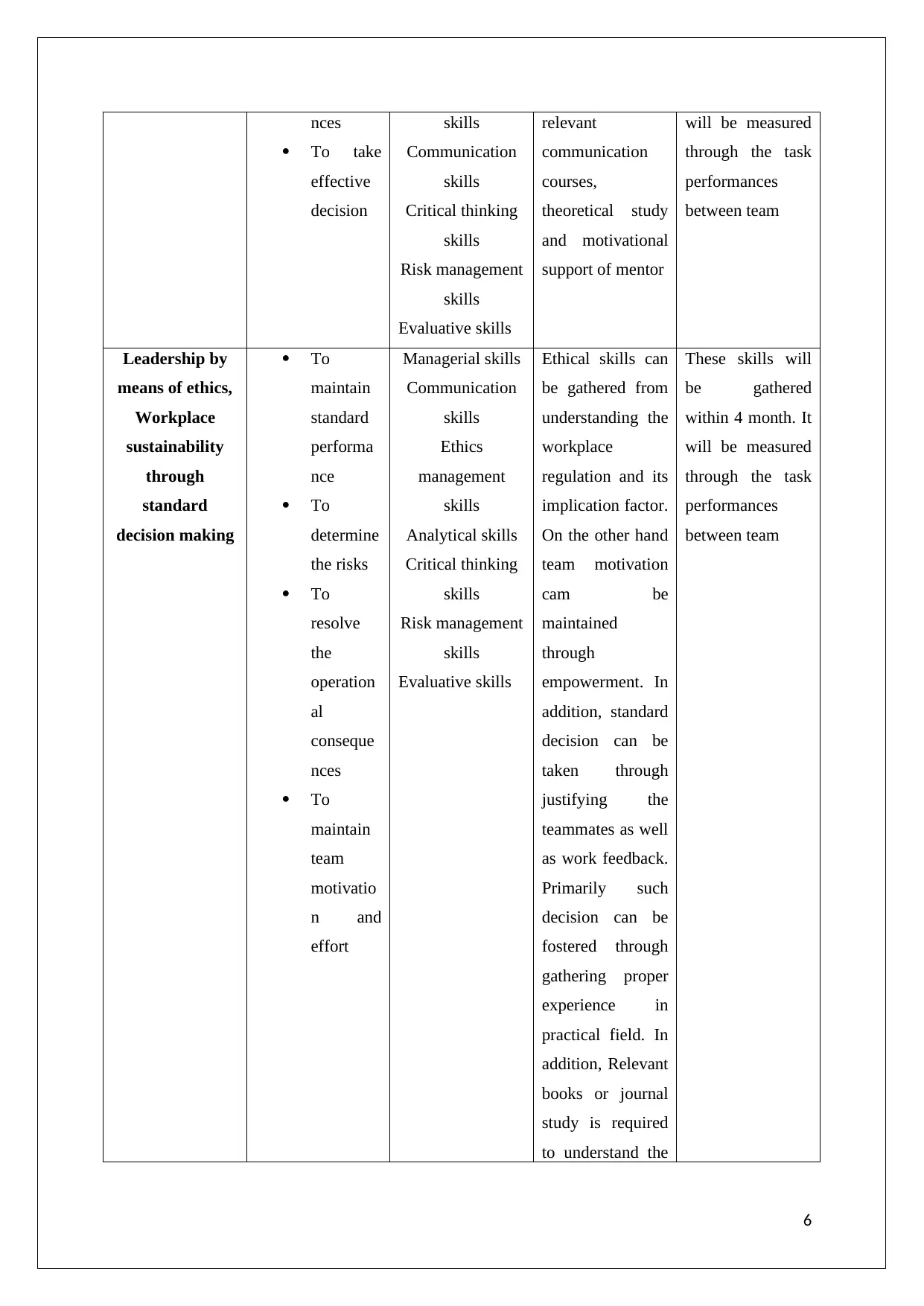
nces
To take
effective
decision
skills
Communication
skills
Critical thinking
skills
Risk management
skills
Evaluative skills
relevant
communication
courses,
theoretical study
and motivational
support of mentor
will be measured
through the task
performances
between team
Leadership by
means of ethics,
Workplace
sustainability
through
standard
decision making
To
maintain
standard
performa
nce
To
determine
the risks
To
resolve
the
operation
al
conseque
nces
To
maintain
team
motivatio
n and
effort
Managerial skills
Communication
skills
Ethics
management
skills
Analytical skills
Critical thinking
skills
Risk management
skills
Evaluative skills
Ethical skills can
be gathered from
understanding the
workplace
regulation and its
implication factor.
On the other hand
team motivation
cam be
maintained
through
empowerment. In
addition, standard
decision can be
taken through
justifying the
teammates as well
as work feedback.
Primarily such
decision can be
fostered through
gathering proper
experience in
practical field. In
addition, Relevant
books or journal
study is required
to understand the
These skills will
be gathered
within 4 month. It
will be measured
through the task
performances
between team
6
To take
effective
decision
skills
Communication
skills
Critical thinking
skills
Risk management
skills
Evaluative skills
relevant
communication
courses,
theoretical study
and motivational
support of mentor
will be measured
through the task
performances
between team
Leadership by
means of ethics,
Workplace
sustainability
through
standard
decision making
To
maintain
standard
performa
nce
To
determine
the risks
To
resolve
the
operation
al
conseque
nces
To
maintain
team
motivatio
n and
effort
Managerial skills
Communication
skills
Ethics
management
skills
Analytical skills
Critical thinking
skills
Risk management
skills
Evaluative skills
Ethical skills can
be gathered from
understanding the
workplace
regulation and its
implication factor.
On the other hand
team motivation
cam be
maintained
through
empowerment. In
addition, standard
decision can be
taken through
justifying the
teammates as well
as work feedback.
Primarily such
decision can be
fostered through
gathering proper
experience in
practical field. In
addition, Relevant
books or journal
study is required
to understand the
These skills will
be gathered
within 4 month. It
will be measured
through the task
performances
between team
6
⊘ This is a preview!⊘
Do you want full access?
Subscribe today to unlock all pages.

Trusted by 1+ million students worldwide
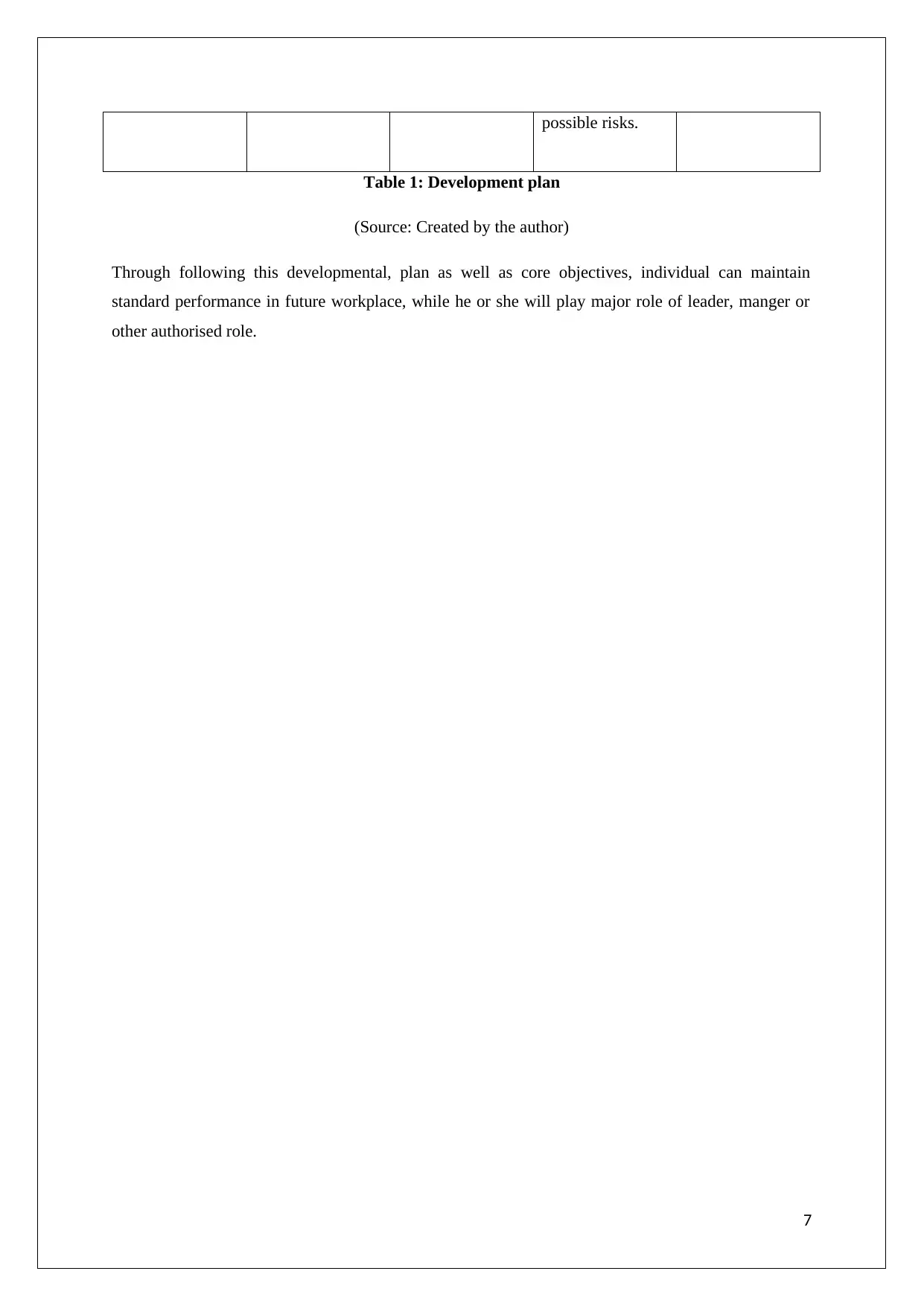
possible risks.
Table 1: Development plan
(Source: Created by the author)
Through following this developmental, plan as well as core objectives, individual can maintain
standard performance in future workplace, while he or she will play major role of leader, manger or
other authorised role.
7
Table 1: Development plan
(Source: Created by the author)
Through following this developmental, plan as well as core objectives, individual can maintain
standard performance in future workplace, while he or she will play major role of leader, manger or
other authorised role.
7
Paraphrase This Document
Need a fresh take? Get an instant paraphrase of this document with our AI Paraphraser
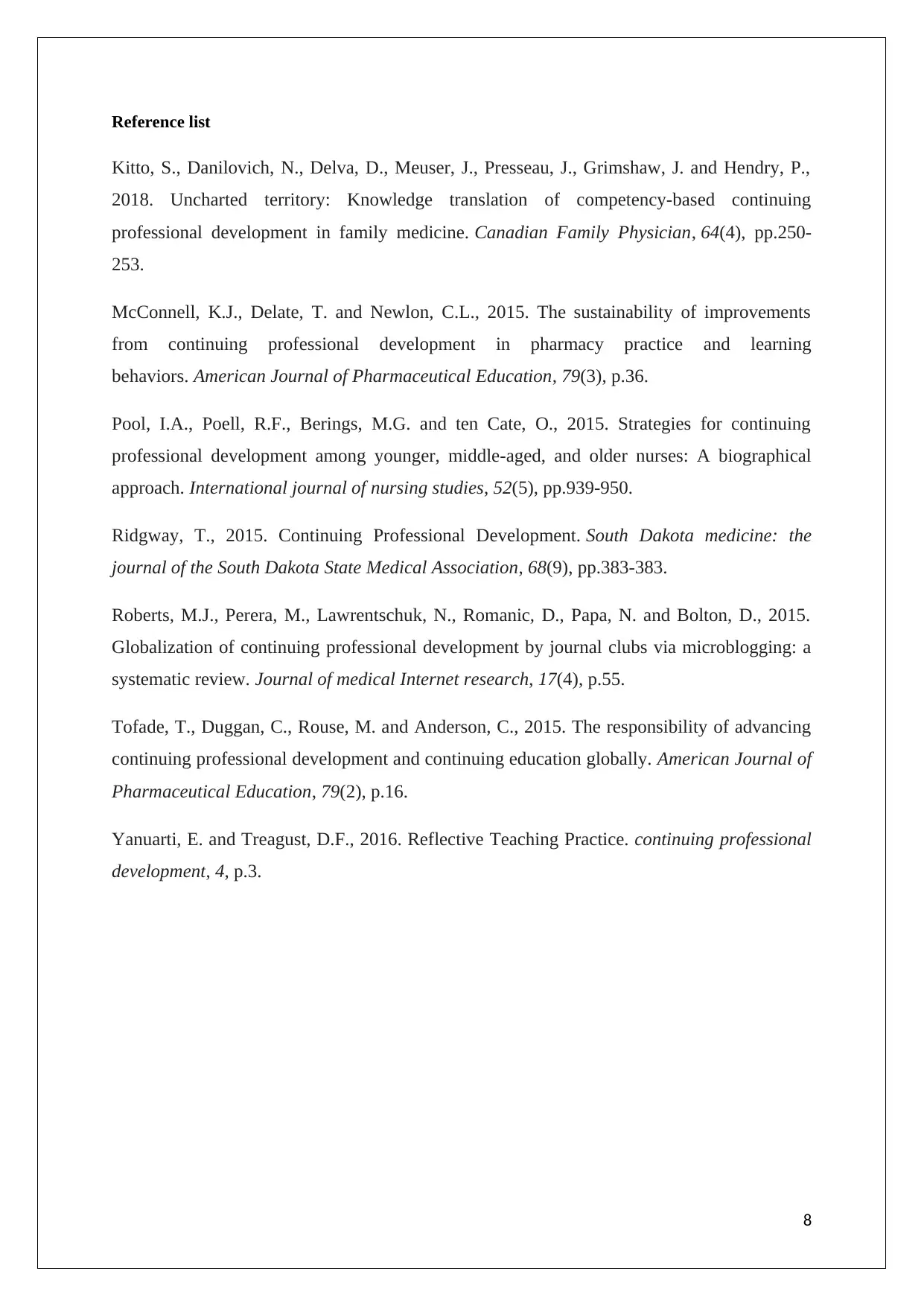
Reference list
Kitto, S., Danilovich, N., Delva, D., Meuser, J., Presseau, J., Grimshaw, J. and Hendry, P.,
2018. Uncharted territory: Knowledge translation of competency-based continuing
professional development in family medicine. Canadian Family Physician, 64(4), pp.250-
253.
McConnell, K.J., Delate, T. and Newlon, C.L., 2015. The sustainability of improvements
from continuing professional development in pharmacy practice and learning
behaviors. American Journal of Pharmaceutical Education, 79(3), p.36.
Pool, I.A., Poell, R.F., Berings, M.G. and ten Cate, O., 2015. Strategies for continuing
professional development among younger, middle-aged, and older nurses: A biographical
approach. International journal of nursing studies, 52(5), pp.939-950.
Ridgway, T., 2015. Continuing Professional Development. South Dakota medicine: the
journal of the South Dakota State Medical Association, 68(9), pp.383-383.
Roberts, M.J., Perera, M., Lawrentschuk, N., Romanic, D., Papa, N. and Bolton, D., 2015.
Globalization of continuing professional development by journal clubs via microblogging: a
systematic review. Journal of medical Internet research, 17(4), p.55.
Tofade, T., Duggan, C., Rouse, M. and Anderson, C., 2015. The responsibility of advancing
continuing professional development and continuing education globally. American Journal of
Pharmaceutical Education, 79(2), p.16.
Yanuarti, E. and Treagust, D.F., 2016. Reflective Teaching Practice. continuing professional
development, 4, p.3.
8
Kitto, S., Danilovich, N., Delva, D., Meuser, J., Presseau, J., Grimshaw, J. and Hendry, P.,
2018. Uncharted territory: Knowledge translation of competency-based continuing
professional development in family medicine. Canadian Family Physician, 64(4), pp.250-
253.
McConnell, K.J., Delate, T. and Newlon, C.L., 2015. The sustainability of improvements
from continuing professional development in pharmacy practice and learning
behaviors. American Journal of Pharmaceutical Education, 79(3), p.36.
Pool, I.A., Poell, R.F., Berings, M.G. and ten Cate, O., 2015. Strategies for continuing
professional development among younger, middle-aged, and older nurses: A biographical
approach. International journal of nursing studies, 52(5), pp.939-950.
Ridgway, T., 2015. Continuing Professional Development. South Dakota medicine: the
journal of the South Dakota State Medical Association, 68(9), pp.383-383.
Roberts, M.J., Perera, M., Lawrentschuk, N., Romanic, D., Papa, N. and Bolton, D., 2015.
Globalization of continuing professional development by journal clubs via microblogging: a
systematic review. Journal of medical Internet research, 17(4), p.55.
Tofade, T., Duggan, C., Rouse, M. and Anderson, C., 2015. The responsibility of advancing
continuing professional development and continuing education globally. American Journal of
Pharmaceutical Education, 79(2), p.16.
Yanuarti, E. and Treagust, D.F., 2016. Reflective Teaching Practice. continuing professional
development, 4, p.3.
8
1 out of 8
Related Documents
Your All-in-One AI-Powered Toolkit for Academic Success.
+13062052269
info@desklib.com
Available 24*7 on WhatsApp / Email
![[object Object]](/_next/static/media/star-bottom.7253800d.svg)
Unlock your academic potential
Copyright © 2020–2026 A2Z Services. All Rights Reserved. Developed and managed by ZUCOL.




